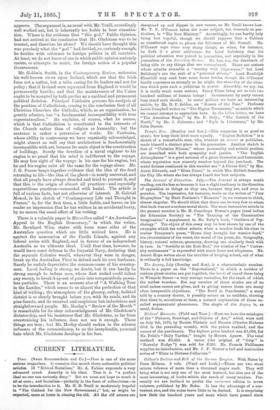of opposition to things as they are, because they are,
and even to paradox. The impression, for instance, made on the writer of "Four Biographies" by Mark Pattison's "Memoirs" is, we venture to think, almost singular. We should think that there can be very few to whom that book was not a serious moral shock. The most instructive article in the present number is Mr. H. Courthope Bowen's paper (read before the Education Society) on "The Training of the Constructive
Imagination," a supplement to Mr. Sally's book, "Outlines of Psy- chology." The object of this essay may be best shown by one of the examples which the writer selects, when a teacher leads his class to
realise Tennyson's poem, "Home they brought her warrior dead," the circumstance of the scene, the moral of the poem, &c. Geography, history, natural science, geometry, drawing are similarly dealt with in turn. In " Bordello at the East-End," the mission of the" Univer- sity settlements" is expounded with mach force and eloquence. Mr. Ascott Hope writes about the troubles of keeping school, out of what is evidently a full knowledge.


































 Previous page
Previous page